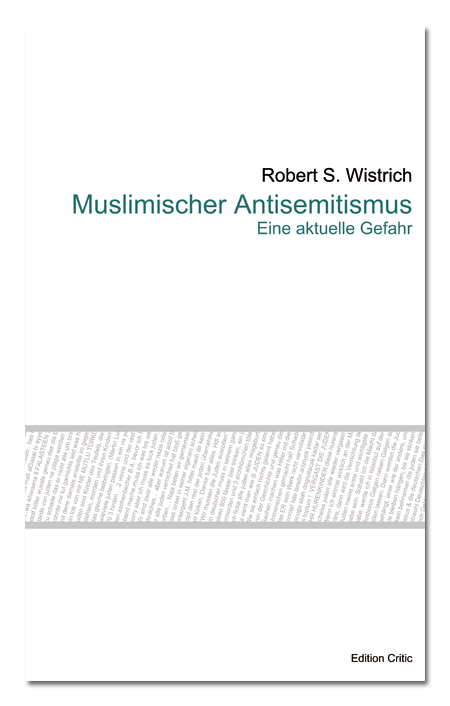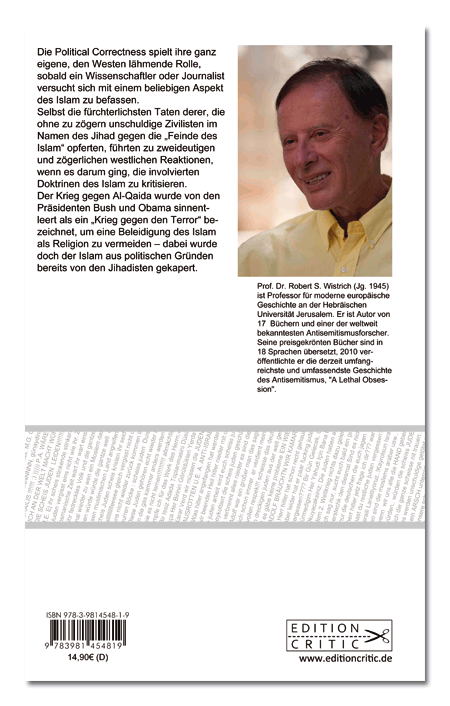Von Dr. Clemens Heni, 23. Oktober 2017
Wir kennen sie aus dem Alltag, die Lücke. Es gibt sie als Baulücke, Bildungslücke, Gesetzeslücke, Sicherheitslücke, Zahnlücke, Bewusstseinslücke oder als Lücke im Lebenslauf. Das kann einem in den Sinn kommen, wenn man sich die aktuelle Sozialwissenschaft anschaut.
2014 attackierte die Leiterin des Zentrums für Antisemitismusforschung an der TU Berlin, Stefanie Schüler-Springorum, mit ihrem Kollegen Uffa Jensen in einem Beitrag für die Zeitschrift „Aus Politik und Zeitgeschichte“ (APuZ) die kritische Antisemitismusforschung:
„Große Bereiche der historischen Forschung untersuchen vornehmlich antisemitische Texte, Bewegungen und Ereignisse und verzichten auf eine konzeptionelle Durchdringung des Materials. In einigen Arbeiten wird Antisemitismus sogar zu einem überzeitlichen Phänomen, das in fast allen nichtjüdischen Gesellschaften auftritt.“
[Dazu die Fußnote: „Vgl. beispielsweise Robert S. Wistrich, A Lethal Obsession: Anti-Semitism from Antiquity to the Global Jihad, New York 2010.][1]
So locker flockig gehen allzu deutsche Forscher*innen über eines der bedeutendsten Werke des wichtigsten Antisemitismusforschers der letzten 40 Jahre hinweg, „Lethal Obsession“ von Robert Solomon Wistrich (1945–2015), langjähriger Direktor des Vidal Sassoon International Center for the Study of Antisemitism (SICSA) an der Hebräischen Universität Jerusalem.
Das Ressentiment gegen die Forschung zu Antisemitismus als „longest hatred“ hat Tradition am ZfA. So schrieb der Soziologe Werner Bergmann schon im Jahr 1988 in der Fachzeitschrift Leviathan:
„Aber auch wenn der Antisemitismus sicherlich ein integraler Bestandteil des abendländischen ‚Kulturerbes‘ und emotional stark besetzt ist – wie jedes Vorurteil –, so steckt im Begriff des ‚ewigen Antisemiten‘ doch die gleiche falsche Anthropologisierung und Naturalisierung wie im ‚ewigen Juden‘.“[2]
Dieses unwissenschaftliche Herunterdeklinieren des genozidalen Antisemitismus, der mit Verschwörungsmythen, Blutbeschuldigungen und Ideologemen der „Zersetzung“, die Juden betrieben, arbeitet, zu einem bloßen „Vorurteil“ unter vielen, ist seit Jahrzehnten Mainstream in diesem Land und Kennzeichen der Arbeitsweise am ZfA. Zugleich kann man so Kritiker des Antisemitismus schwuppdiwupp zu Nazis machen, beide dächten ähnlich.
Vor gut 10 Jahren, im September 2007, nahm ein Kader der neo-nationalsozialistischen NPD, Stefan Lux, an einer Sommeruniversität des ZfA zu Antisemitismus teil, entgegen dem Protest von Antifaschist*innen, – verantwortlich waren dafür u.a. Werner Bergmann, aber auch Wolfgang Benz. Bergmann schrieb dann 2011 in einer Festschrift für einen Kollegen:
„Im historischen Vergleich mit der Zeit vor 1945, aber auch in den letzten 60 Jahren in Deutschland […] war Antisemitismus gesamtgesellschaftlich wohl selten so sehr an den Rand gedrängt wie heute.“
Angesichts von Hunderten Pro-Hitler- und Pro-Juden-ins-Gas-Statements Ende Mai und Anfang Juni 2010 auf Facebook nach der Mavi Marmara Aktion im Mittelmeer von jihadistischen Gruppen und ihren Freund*innen auch in der Linkspartei schreibt ein führender Soziologe des ZfA so etwas. Das zeugt von einem kompletten Realitätsverlust. Im Sommer 2014 im Zuge des Krieges Israels gegen die Hamas im Gazastreifen hatten wir sodann die vielleicht brutalsten und gefährlichsten antisemitischen Demonstrationen und Aktionen seit Jahrzehnten überhaupt.
Dazu kommt ein Antisemitismus bis weit in die Mitte der deutschen Gesellschaft, sei es die Ablehnung der jüdischen Beschneidung wie 2012 in einem Kölner Landgerichtsurteil und in dessen Gefolge durch die Diffamierung des Judentums und der Beschneidung von der FAZ über die Giordano Bruno Stiftung bis hin zur Postille Bahamas, oder sei es die Trivialisierung des Holocaust durch Joachim Gauck, der meint, jene, die die Einzigartigkeit der Shoah betonten, wollten nur ein „inneres Loch“ stopfen, das der Tod Gottes hinterlassen habe. Seine Gleichsetzung von rot und braun via Prager Deklaration 2008, dem Schwarzbuch Kommunismus oder der Initiative 23. August ist in Deutschland quasi Staatsdoktrin, was nur ein weiterer Ausdruck des sekundären Antisemitismus bedeutet, einer Erinnerungsabwehr an Auschwitz, das wahlweise mit DDR-Kindergärten, der Mauer, Israels Politik oder der Antifa („Linksfaschismus“ bei den G20-Protesten etc.) verglichen wird.
Das alles nicht zu sehen, und zu behaupten, es gebe heute so wenig Antisemitismus wie wohl noch nie seit 1945, zeugt von einem Realitätsverlust am Zentrum für Antisemitismusforschung (ZfA) und ist typisch für die deutsche Forschungslandschaft, den Zustand von Sozial- wie Geisteswissenschaften. Auch der Wahlerfolg der AfD zeigt, wie massiv Antisemitismus in der Gesellschaft verankert ist und jetzt im Bundestag sitzen wird, mit 12,6%.
2010 lud die damalige Leiterin des Instituts für die Geschichte der Deutschen Juden in Hamburg Schüler-Springorum die israelfeindliche Historikerin Tamar Amar-Dahl ein, 2012 engagierte Schüler-Springorum den antizionistischen Forscher Achim Rohde am ZfA, der es schafft, in seiner Dissertation zu Geschlechterverhältnissen im Irak antiisraelische Agitator*innen wie Jacqueline Rose oder Edward Said zu zitieren, die zu Geschlechterverhältnissen im Irak gar nichts zu sagen haben. Zum Nazi-Doktorvater Karl Bosl ihres Vorgängers Wolfgang Benz schwieg Schüler-Springorum, wie alle am ZfA, der Pädagoge Micha Brumlik war hingegen entsetzt.
Was aber sagt das Zentrum für Antisemitismusforschung neben der Ablehnung der weltweit führenden Antisemitismusforschung von Wistrich sonst noch zur heutigen kritischen Forschung zum Antisemitismus? Schüler-Springorum und Jensen schreiben 2014 in APuZ (S. 18):
„Kommt es doch zu einer theoretischen Einordnung, geschieht dies zumeist mit Bezug auf einen bestimmten Teil der sozialwissenschaftlichen und sozialpsychologischen Debatten, nämlich der weitgehend empirisch arbeitenden Vorurteilsforschung.“
[Dazu die Fußnote: „Es gibt noch einen zweiten Strang der sozialwissenschaftlichen Forschungen, der allerdings kaum noch in der historischen Forschung aufgegriffen wird und deshalb hier nur erwähnt werden soll. Gemeint sind die Sozialtheorien zum Antisemitismus, die in der Tradition der Kritischen Theorie oder/und der Psychoanalyse stehen. Vgl. vor allem Moishe Postone, Die Logik des Antisemitismus, in: Merkur, 36 (1982) 1, S. 13–25; Samuel Salzborn, Antisemitismus als negative Leitidee der Moderne. Sozialwissenschaftliche Theorien im Vergleich, Frankfurt/M. 2010.]
Weder Kritische Theorie und Psychoanalyse noch Samuel Salzborn sind am ZfA wohlgelitten, ja werden wie selbstverständlich abgewehrt. Kritik ist ein No-Go am ZfA. Salzborn hat einige wichtige und interessante Texte zur Kritik am Rechtsextremismus, der Neuen Rechten und der AfD geschrieben.
Am 23. Oktober 2017 schreibt er in der taz über das Versagen der Politikwissenschaft bezüglich der Beschäftigung mit dem Nationalsozialismus und dem Nazi-Erbe in der Bundesrepublik. Auch wenn er dabei eine der zentralsten Forschungsarbeiten der frühen 1940er Jahre, um die geht es in dem Text, gerade nicht erwähnt und nicht zu kennen scheint, Peter Vierecks „Metapolitics“, die viel umfassender den deutschen Weg in den Nationalsozialismus beschreibt als viele Politologen bis heute, so hat er doch völlig recht mit seiner Kritik an der gegenwärtigen Politikwissenschaft.
Die größte Debatte über die nationalsozialistische Vergangenheit und die Shoah war zweifellos die Goldhagen-Debatte 1996 und in den folgenden Jahren. Und gerade diese Debatte zeigte, wie abwehrend wiederum das Zentrum für Antisemitismusforschung arbeitet. Es gab 1998 einen Sammelband heraus – „Geschichtswissenschaft und Öffentlichkeit“ –, darin ist auch ein Beitrag des Historikers Uffa Jensen. In seinem Text greift er den Politikwissenschaftler Daniel J. Goldhagen wie auch den Sozialphilosophen Jürgen Habermas frontal an.[3] Goldhagen würde „sehr wohl generalisierende Vorwürfe“ über die „ganz normalen Deutschen“[4] erheben und Habermas krönte das auch noch mit einem Demokratiepreis, ja würde Goldhagen vergöttlichen, eine „Apotheose“ betreiben.
Ein Jude und Historiker, der wie kein anderer zuvor eine breite und angeregte Debatte über die Deutschen und den eliminatorischen Antisemitismus entfachte, würde also von einem führenden Intellektuellen des Landes gleichsam vergöttlicht. Neo-Nazis sprechen in ihrer Diktion gleich direkt von „Holocaustreligion“ oder linke Antisemiten von einer „Pilgerfahrt nach Auschwitz“, kann man da nur sagen.
Der Politikwissenschaftler Lars Rensmann hat in seiner Dissertation Uffa Jensen 2004 kritisiert:
„Die antisemitische Identifikation Goldhagens als jemand, der aus bloß materiellem Interesse, als ‚Geldjude‘, aus der Vergangenheit der Deutschen und ihrer ‚kollektiven Verdammung‘ seinen Vorteil ziehen wollte – dieses hervorstechende sekundär-antisemitische Ideologem hat in der Goldhagen-Debatte erstmals in der ‚Berliner Republik‘ öffentliche Fürsprecher in Medien, Politik und Wissenschaft gefunden (…). So steigert sich noch in einem Rückblick auf die Debatte im Jahre 1998 (…) [der Historiker, CH] Uffa Jensen im wissenschaftlichen Duktus zu folgender antisemitischer Zuschreibung:
‚Das Subsystem ‚Geld‘ ist mit Goldhagen in den rational-aufklärerischen Diskurs der Selbstverständigungsdebatte eingedrungen, der sich zwischen Historikern und Lesern entspannen könnte, und droht, ihn zu ‚kolonisieren‘, wenn sich ähnliche publizistische Praktiken in Zukunft [„etablieren“, CH].‘
Hier wird Goldhagen mit ‚Geld‘ identifiziert (…). Ein amerikanisch-jüdischer Autor mit seinem vermeintlich bloß materiellen Interesse avanciert in dieser Vergrößerungsprojektion und in grotesker Applikation einer Mischung aus Luhmannscher und Habermasscher Begriffe zum personifizierten ‚Kolonisator‘, der mit seinen jüdischen Geldinteressen die innerdeutsche Selbstverständigung zerstört.“[5]
Nun wird im Herbst 2017 Uffa Jensen[6] Professor am Zentrum für Antisemitismusforschung (ZfA), und Samuel Salzborn wird zeitgleich für einige Zeit Gastprofessor am ZfA, wie die taz in der Personenbeschreibung festhält. Salzborn war an der Uni Göttingen nicht mehr wohl gelitten, was 2016 eine bundesweite Solidaritätsaktion unter Forschungskolleg*innen auslöste. Sein Vertrag endete im Sommer 2017.
Das ZfA hat jetzt doch noch für ein kleines „Zeitfenster“ (so nennt man das heute) erstmals ein Feigenblatt[7] gefunden und zudem wird so eine mögliche Lücke im Lebenslauf eines jungen Menschen präventiv geschlossen. Das nennt die Wissenschaft eine „Win-Win-Situation“.
[1] Uffa Jensen/Stefanie Schüler-Springorum (2014): Antisemitismus und Emotionen, APuZ 28–30/2014, 17–24, 18.
[2] Werner Bergmann (1988): Politische Psychologie des Antisemitismus. Kritischer Literaturbericht, in: Helmut König (Hrsg.), Politische Psychologie. Leviathan. Zeitschrift für Sozialwissenschaft, Sonderheft 9/1988, 217–234, 230f.
[3] Uffa Jensen (1998): Ein Ritterschlag zum Lehrmeister? Die Apotheose des Daniel J. Goldhagen in der Laudatio von Jürgen Habermas, in: Johannes Heil/Rainer Erb (Hg.), Geschichtswissenschaft und Öffentlichkeit, Frankfurt a.M.: Fischer, 148–163.
[4] Jensen 1998, 150.
[5] Lars Rensmann (2004): Demokratie und Judenbild. Antisemitismus in der politischen Kultur der Bundesrepublik Deutschland, Wiesbaden: Verlag für Sozialwissenschaften, 354.
[6] „Mit Prof. Dr. Uffa Jensen konnte die TU Berlin einen herausragenden Wissenschaftler gewinnen, der ein breites Lehr- und Forschungsprofil aufweist und als einer der profundesten Kenner sowohl des modernen Antisemitismus als auch der Emotionsgeschichte gilt.“
[1] Feigenblätter „sind rund 20 bis 30 Zentimeter lang und fast ebenso breit.“
[2] „Als Metapher bezeichnet das Feigenblatt einen Gegenstand, der vor einen anderen Gegenstand gestellt ist, um diesen in der Absicht zu verbergen, dessen moralisch angreifbare Eigenschaft nicht gewahr werden zu lassen.“
©ClemensHeni


